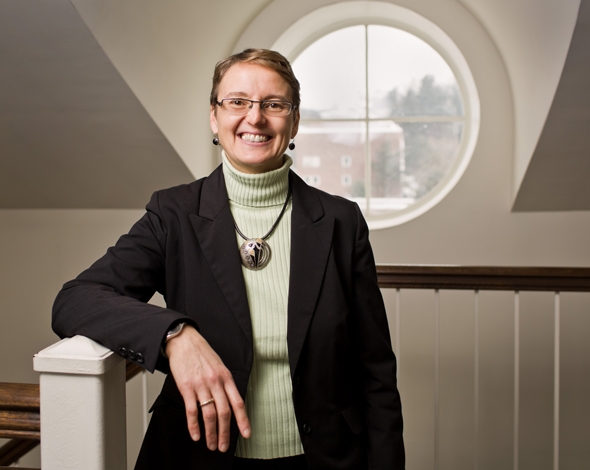By Joni B. Cole
This Focus on Faculty Q&A is part of an ongoing series of interviews exploring what keeps Dartmouth professors busy inside—and outside—the classroom.

Lisa Adams, MED ’90, wears many hats. She is an associate professor of medicine and of community and family medicine at the Geisel School of Medicine. As a doctor of internal medicine working in infectious disease, she’s an international TB consultant, director of both the Global Health Initiative and Center for Health Equity at Dartmouth, and an associate dean for global health. She also has a part-time practice screening immigrants and refugees, and is the mother of two teenagers. Recently, Adams discussed the value of partnerships on the work front and the home front, and the leap of faith that brought her back to this part of the world.
In 2013, you helped establish the Center for Health Equity at Geisel. What was your vision?The idea was to have under one roof both domestic and global programs that promote health equity and focus on care of underserved populations. There are more similarities than differences working with underserved populations, whether they live locally, on a Native American reservation, or in Dar es Salaam, Tanzania. We try to help students develop careers addressing these health inequities through research, teaching, and practice.
You went to Rwanda for six months to help launch that country’s efforts to revolutionize its medical education system. Your family went with you. How was that experience?It was really good see how we do out of our comfort zone; to appreciate how many people live with so much less, yet there’s also incredible beauty. The kids felt homesick, but the students at the international school were very welcoming. My favorite story about Lea is when I was asking her if one of her classmates was from Tanzania, and she rolled her eyes as only a soon-to-be teenager can do and said, “No Mom. She’s from Burkina Faso, obviously.” I just loved that because, three months earlier, Lea didn’t know Burkina Faso was a country.
Entering medical school, did you know your career path?I certainly came with an idea that I wanted to work with underserved populations. I was raised with a sense of moral responsibility; we’re all in it together. That was also something fostered through my mentors at Dartmouth. Then I did my primary care rotation on the Navajo reservation in Tuba City, Arizona. I saw providers who were so good at melding cross-cultural understanding into their practice. That changed everything.
During your residency at Cambridge Hospital (Harvard Medical School), you created an elective that took you to Albania. Why there?Albania’s Communist “walls” came down, and suddenly foreigners could enter the country. All four of my grandparents emigrated from Albania. It had always been this mythical place. I promised myself I’d learn the language and come back, but then funding streams and opportunities changed and I ended up in Kosovo. That’s when I happened to be assigned to a tuberculosis project, and that set me down this trajectory of working in tuberculosis and related infectious diseases.
Prior to coming to Dartmouth, you were the director of surveillance in the TB bureau of the New York City health department. Why leave?After September 11 my husband, Lars, and I decided it would be good to, literally, find greener pastures. We’d been up here for my 10-year reunion and loved the area. Lars’ passion was mountain biking, so it was an easy sell for him. He telecommuted to make it financially feasible, but I took a leap of faith because there wasn’t a position for me. We had a 7-month-old and 3-year-old, so that kept me busy. A fantasy was to come back and work with Ford von Reyn on his programs in Tanzania, and that fantasy came true.
In your courses on global health, what are some key lessons?There’s this misconception that all the solutions rest in what we call the Global North. It’s not about that at all. It’s about collaboration, and there are plenty of good ideas from our partners in low-income countries to implement here. Also, I’m the first person to say you don’t need to travel across the ocean to take care of people in need of services they might not have access to otherwise.
In all your travels, does one memory stand out?I will say that the relationship I’ve developed with my Rwanda “twin”—my counterpart in the Human Resources for Health program—has been fantastic. He’s the director of the HIV clinic there. I feel like we’re family. When we had our going-away party, I said I would love to have It’s a Wonderful World be the last song. My husband doesn’t dance, so my twin and I did.
You’re a mom with a demanding schedule. How does it work on the home front?It’s all about partnerships. Lars and I really do co-parent. One of my favorite stories is when the kids were little and I came back after two weeks in Kazakhstan. I traveled 26 hours over 12 time zones. I’m exhausted, but so excited to see the kids that I get this second wind. Then I look around. “Where did Daddy go?” He’s fast asleep on our bed. Yes, it is more exhausting to be the single parent of a toddler and preschooler for two weeks than to make this epic journey home from a work trip.
What’s a typical weekend like now in your household?We’re a pretty active family, so our ideal weekend is going cross-country skiing, or biking in summertime, or for a trail run. Running and other exercise, that’s my recharge. It’s nice to keep physically fit, but for me it’s even more about my mental fitness.
This interview has been edited and condensed.
